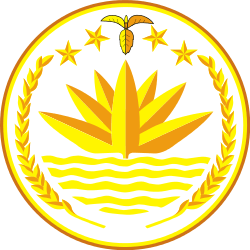Bangladesh–Russia relations
 |
|
Bangladesh |
Russia |
|---|---|

Bangladesh–Russia relations refers to foreign relations between Bangladesh and Russia. Russia has an embassy in Dhaka and a consulate-general in Chittagong, while Bangladesh has an embassy in Moscow. Diplomatic relations between the USSR and Bangladesh were established on January 25, 1972.[1] These relations have continued with Russia being the successor state to Soviet Union.
Soviet era Relations
The Soviet Union had been a strong supporter of the Mukti Bahini in the Bangladesh Liberation War and provided aid to the new nation.[2] However, after the victory of the 1971 war and the independence of Bangladesh there had been a buildup of suspicion amongst the Bangladeshis due to the prolonged presence of Soviet officials.
Relations with the Soviet Union were cordial in the years immediately following independence. The Soviet Union supported Indian actions in aiding the war of independence, and after the war the Soviet Navy sent a floating workshop to Bangladesh for clearing Pakistani mines from the Chittagong and Chalna harbors.
After the 1975 coup, relations with the Soviet Union rapidly cooled. The military regimes of Zia and Ershad deemphasized socialist policies and encouraged closer ties with the United States, Arab states, Pakistan, and the Peoples Republic of China—all of which were politically distant from the Soviet Union. Bangladesh condemned Soviet support for Vietnam's occupation of Cambodia and Bangladesh also strongly opposed the 1979 Soviet invasion of Afghanistan along with other Western and Islamic nations and contributed to the effort to force the Soviet Union to withdraw. In 1989, the Soviet Union ranked 14th among aid donors to Bangladesh. The Soviets focused on the development of electrical power, natural gas and oil, and maintained active cultural relations with Bangladesh. They financed the Ghorasal thermal power station, the largest in Bangladesh. A low point in Bangladeshi-Soviet relations came after the expulsion of nine Soviet diplomats from Dhaka in December 1983 and January 1984.
State visits
In March 1972, Bangladesh Prime Minister Sheikh Mujibur Rahman visited Moscow to thank the Soviet Union for their support in 1971.[3][4][5]
Post Soviet era relations
Russia has conducted an aggressive military sales effort in Bangladesh and has succeeded with a $124 million deal for eight MIG-29 fighter jets. One example of cooperation in energy is Russia offering its assistance to help build Bangladesh's nuclear reactor.
Agreements
In 2012, the two countries signed two key Memorandums of Understanding (MoU) which would further facilitate collaboration between the two countries in developing the nuclear power sector in Bangladesh.[6]
State visits
In 2009, Bangladeshi Prime Minister Sheikh Hasina visited St. Petersburg and met Russian President Vladimir Putin [7]
In January 2013, Bangladeshi Prime Minister Sheikh Hasina visited Russian President Vladimir Putin in Moscow.[8]
References
- ↑ http://www.bangladesh.mid.ru/relations.html
- ↑ http://www.mofa.gov.bd/PressRelease/PrintPRDetails.php?txtUserId=&PRid=410
- ↑ http://news.google.com/newspapers?nid=1873&dat=19720301&id=63w0AAAAIBAJ&sjid=udEEAAAAIBAJ&pg=6674,64119
- ↑ http://www.dhakacourier.com.bd/?p=9856
- ↑ http://www.jstor.org/discover/10.2307/40394640?uid=3737536&uid=2129&uid=2&uid=70&uid=4&sid=21101731103703
- ↑ http://www.mofa.gov.bd/index.php?option=com_content&view=article&id=168&catid=43&PRid=591&Itemid=1
- ↑ http://www.thedailystar.net/RoundTable/2013/2013_03_02/index.html
- ↑ http://english.ruvr.ru/2013_01_15/Agreements-between-Russia-and-Bangladesh-promote-bilateral-relations/
See also
| ||||||||||||||||||||||||||||||||||||||||||||||||||||||||

